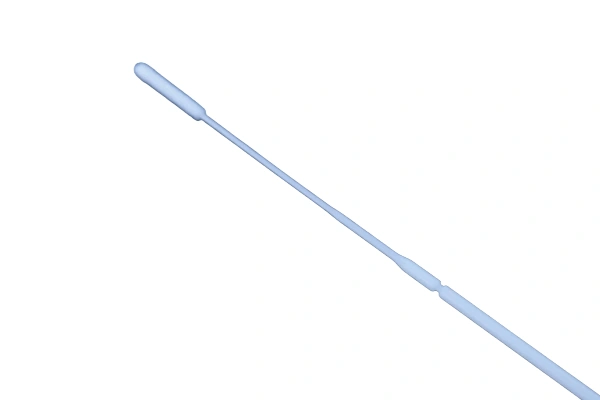what is disposable sampling swabs

Core Definition
A disposable sampling swab is a sterile, single-use device designed specifically for collecting biological samples from humans, animals, or surfaces for clinical testing, environmental monitoring, or forensic analysis. Their key characteristic is that they are used once and then discarded to prevent cross-contamination between samples and ensure the accuracy of test results.
They are fundamentally different from common cotton swabs (huachenyang) found at home, as they are engineered for scientific and medical precision.
Key Components & Design
Swab Tip (Head):
Material: Not made of standard cotton. Cotton contains natural oils and compounds that can inhibit Polymerase Chain Reaction (PCR) tests, potentially leading to false-negative results.
Common Materials: Synthetic materials like polyester, rayon, nylon, or flocked fibers.
Flocked Technology: A premium design where millions of short, perpendicular nylon fibers are sprayed onto the tip. This creates a brush-like effect that dramatically improves sample absorption and release, crucial for sensitive molecular diagnostics.
Shaft:
Material: Made of plastic (e.g., polystyrene or polypropylene) or sometimes hollow aluminum. Plastic shafts are often designed with a breakpoint.
Breakpoint: A pre-scored, weak point in the shaft. After sample collection, the swab can be easily snapped at this point, allowing the tip to fall into a tube of transport medium without opening the tube completely. This enhances safety and convenience for the operator.
Packaging: Each swab is individually packaged and sterilized (typically using Gamma Irradiation or Ethylene Oxide gas) to maintain sterility until use.
Why Their Design is Critical
Sterility: Guarantees that no external microorganisms contaminate the sample.
Nuclease-Free: Manufactured to be free of enzymes (DNases and RNases) that could degrade DNA or RNA before it reaches the lab. This is vital for genetic and pathogen testing.
Sample Integrity: The materials are chosen to not interfere with laboratory assays, ensuring an accurate analysis.
Safety: Single-use design eliminates the risk of transmitting infections between patients or samples.
Common Types and Uses
Nasopharyngeal (NP) Swabs: Long, flexible shaft for deep nasal collection. Primarily used for respiratory virus testing (e.g., COVID-19, influenza, RSV).
Oropharyngeal Swabs: Standard length with a textured tip for collecting samples from the back of the throat and tonsils (for strep throat or COVID-19 tests).
Anterior Nares Swabs: Short, soft tip for collecting samples from just inside the nostrils. Often used for self-collection.
Flocked Swabs: Used for a wide range of applications where maximum sample collection and release is needed (e.g., virology, cytology, forensics).
Foam-Tipped Swabs: Used for environmental surface sampling or skin antisepsis.
Forensic Swabs: Specifically designed for collecting DNA evidence from crime scenes.
Disposable vs. Cotton Swabs
Feature Disposable Sampling Swab Common Cotton Swab
Tip Material Synthetic (Polyester, Nylon, Flocked) Cotton
Sterility Sterile, individually packaged Not sterile
Purpose Medical diagnostics, scientific analysis Personal hygiene, cosmetic application, arts & crafts
Design Engineered for specific sample types (e.g., breakpoint shaft) Simple, generic design
Regulation Regulated as a medical device Regulated as a consumer commodity
Summary
In essence, a disposable sampling swab is a precision medical tool. Its design, materials, and sterility are all optimized for one purpose: to safely and effectively collect a biological sample and preserve its integrity for accurate laboratory testing. They are a critical component in modern healthcare, diagnostics, and scientific research.
 A professional supplier of swabs
A professional supplier of swabs
